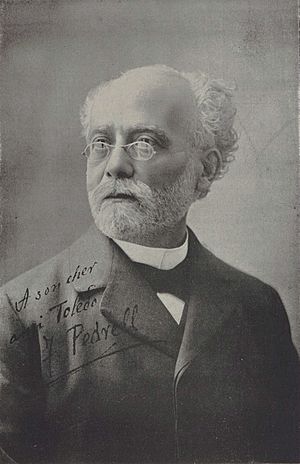Felip Pedrell facts for kids
Felip Pedrell Sabaté (born February 19, 1841 – died August 19, 1922) was a famous Spanish composer, guitarist, and music expert. He was born in Catalonia, a region in Spain. Pedrell is known for helping to bring Spanish music to the world stage. He also taught many important composers.
Contents
Felip Pedrell's Early Life and Music
Felip Pedrell was born in a town called Tortosa in Catalonia. When he was nine years old, he started singing as a boy soprano at the Tortosa Cathedral. A "chapel master" named Joan Nin i Serra taught him most of his music there. A chapel master was like a music director for the church.
In 1867, he got married and later had a daughter.
Moving to Barcelona and New Ideas
In 1873, Pedrell moved to Barcelona. There, he helped lead a group that performed zarzuelas. A zarzuela is a Spanish type of musical play that mixes singing and speaking. He also learned to play the guitar with José Brocá. Pedrell was very impressed by another guitarist, Francisco Tárrega, and even wrote some music for him.
By this time, Pedrell had already written over 100 pieces of music. Most of these were piano pieces for social gatherings. He also wrote songs and works for the stage, like his opera L'último Abenzeraggio. An opera is a play where most of the words are sung. This opera was first performed in 1874.
Between 1876 and 1880, Pedrell lived in Italy and France. In Rome, he became very interested in "musicology." This is the study of music history and how music works. In Paris, he focused on writing music. He created a group of songs called Orientales and a "symphonic poem" called Excelsior. A symphonic poem is a piece of music for an orchestra that tells a story or describes something.
Teaching and Spanish Music Style
In 1880, Pedrell settled back in Barcelona. He became a music teacher and composer. He met young composers like Isaac Albéniz and Enrique Granados, who became his first students. Other famous students included Manuel de Falla.
Pedrell had a big idea: he wanted to create a "national school of music" in Spain. This school would mix traditional Spanish folk music with classical music. His opera Els Pirineus (1891) showed this idea. He also wrote a book called Por nuestra música (To Our Music) in 1891. This book helped many musicians realize how important Spanish folk music was. His ideas influenced other composers, like Manuel de Falla, who wrote a piece called "Pedrelliana" in his honor.
Working in Madrid and Studying Old Music
From 1891 to 1904, Pedrell lived in Madrid. He became a member of the Royal Academy of Fine Arts and taught music history at the Royal Conservatory.
In 1894, he started publishing a series of old Spanish church music called Hispaniae schola musica sacra. As a musicologist, Pedrell was very interested in "early music," which means music from long ago. He edited all the works of famous composers like Tomas Luis de Victoria and Joan Brudieu. His work helped people become very interested in Spain's old music.
Pedrell returned to Barcelona in 1904. His opera Els Pirineus was finally performed there.
In his later years, Pedrell became less active in public life. His last students helped him with his final publications and music. He passed away in Barcelona in 1922. His personal papers are kept safe at the Library of Catalonia.
Some of his most famous students were Isaac Albéniz, Enrique Granados, Joaquín Turina, and Manuel de Falla.
Felip Pedrell's Works
Felip Pedrell wrote many different kinds of music.
Operas
- L'último Abenzeraggio (The Last Abencerraje) (1868, revised in 1874 and 1889): An opera in four acts.
- Quasimodo (1875): An opera in four acts, based on a famous story.
- Els Pirineus (The Pyrenees) (1891): An opera in three acts with a prologue.
- La Celestina (1902): An opera in four acts.
- El comte Arnau (Count Arnau) (1904): A "popular lyrical festival."
- He also wrote five other operas and eight zarzuelas.
Instrumental Works
These are pieces for musical instruments.
- Nocturnos-trío (1873)
- La veu de les muntanyes (The Voice of the Mountains) (1877): A symphonic poem.
- Excelsior (1880): Another symphonic poem.
- He wrote many pieces for piano and guitar.
Songs for Voice and Piano
- Noches de España (Nights of Spain) (1871)
- Orientales (1876): Songs based on poems by Victor Hugo.
- Consolations (1876): Songs based on poems by Théophile Gautier.
- La primavera (Spring) (1880)
- Canciones arabescas (Arabian Songs) (1906)
Choral Music
This is music written for a choir to sing.
- 56 sacred songs in Latin.
- 27 works in Spanish or Catalan.
- 18 works for chorus and orchestra.
See also
 In Spanish: Felipe Pedrell para niños
In Spanish: Felipe Pedrell para niños


